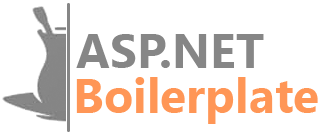In this document
Introduction
ASP.NET Boilerplate is integrated in to the ASP.NET MVC Controllers via the Abp.Web.Mvc NuGet package. You can create regular MVC Controllers as you always do. Dependency Injection properly works for regular MVC Controllers, but you should derive your controllers from AbpController, which provides several benefits and provides for better integration in to ASP.NET Boilerplate.
AbpController Base Class
This is a simple controller derived from AbpController:
public class HomeController : AbpController
{
public ActionResult Index()
{
return View();
}
}
Localization
AbpController defines L method to make localization easier. Example:
public class HomeController : AbpController
{
public HomeController()
{
LocalizationSourceName = "MySourceName";
}
public ActionResult Index()
{
var helloWorldText = L("HelloWorld");
return View();
}
}
You should set LocalizationSourceName to make the L method work. You can set it in your own base controller class, so you don't have to repeat it for each controller.
Others
You can also use the pre-injected AbpSession, EventBus, PermissionManager, PermissionChecker, SettingManager, FeatureManager, FeatureChecker, LocalizationManager, Logger, and CurrentUnitOfWork base properties and more.
Filters
Exception Handling & Result Wrapping
All exceptions are automatically handled, logged, and a proper response is returned to the client. See the exception handling documentation for more.
ASP.NET Boilerplate also wraps action results by default if the return type is JsonResult (or Task<JsonResult> for async actions).
You can change exception handling and wrapping by using the WrapResult and DontWrapResult attributes for controllers or actions or from the startup configuration (using Configuration.Modules.AbpMvc()...) globally. See the ajax documentation for more info.
WrapResultFilters
You can also implement a custom IWrapResultFilter and decide result wrapping conditionally by the current request URL. A custom result wrapping filter must be added to WrapResultFilters as shown below;
Configuration.Modules.AbpWebCommon().WrapResultFilters.Add(new MyWrapResultFilter());
This approach can be useful if you don't have access the source code of the Controllers and can't used result wrapping attributes on the Controllers.
Audit Logging
The AbpMvcAuditFilter is used to integrate to the audit logging system. It logs all requests to all actions by default (if auditing is not disabled). You can control audit logging using the Audited and DisableAuditing attributes for actions and controllers.
Validation
The AbpMvcValidationFilter automatically checks ModelState.IsValid and prevents execution of the action if it's not valid. It also implements input DTO validation described in the validation documentation.
Authorization
You can use AbpMvcAuthorize attribute for your controllers or actions to prevent unauthorized users from using your controllers and actions. Example:
public class HomeController : AbpController
{
[AbpMvcAuthorize("MyPermissionName")]
public ActionResult Index()
{
return View();
}
}
You can define the AllowAnonymous attribute for actions or controllers to suppress authentication/authorization. The AbpController also defines an IsGranted method as a shortcut to check permissions.
See the authorization documentation for more info.
Unit Of Work
The AbpMvcUowFilter is used to integrate to the Unit of Work system. It automatically begins a new unit of work before an action execution, and if no exception is thrown, completes the unit of work after the action's execution.
You can use the UnitOfWork attribute to control the behaviour of the UOW for an action. You can also use the startup configuration to change the default unit of work attribute for all actions.
Anti Forgery
The AbpAntiForgeryMvcFilter is used to auto-protect MVC actions for POST, PUT and DELETE requests from CSRF/XSRF attacks. See the CSRF documentation for more.
Model Binders
The AbpMvcDateTimeBinder is used to normalize DateTime (and Nullable<DateTime>) inputs using the Clock.Normalize method.
